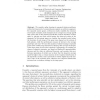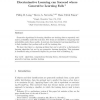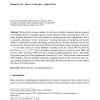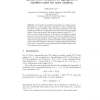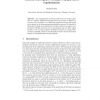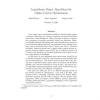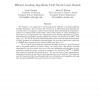126
click to vote
COLT
2006
Springer
15 years 6 months ago
2006
Springer
In this paper, we study a sequential decision making problem. The objective is to maximize the total reward while satisfying constraints, which are defined at every time step. The...
129
click to vote
COLT
2006
Springer
15 years 6 months ago
2006
Springer
We consider online learning in repeated decision problems, within the framework of a repeated game against an arbitrary opponent. For repeated matrix games, well known results esta...
112
click to vote
COLT
2006
Springer
15 years 6 months ago
2006
Springer
Generative algorithms for learning classifiers use training data to separately estimate a probability model for each class. New items are classified by comparing their probabiliti...
112
click to vote
COLT
2006
Springer
15 years 6 months ago
2006
Springer
Abstract. We present an improved version of random projections that takes advantage of marginal norms. Using a maximum likelihood estimator (MLE), marginconstrained random projecti...
108
click to vote
COLT
2006
Springer
15 years 6 months ago
2006
Springer
We study the average number of well-chosen labeled examples that are required for a helpful teacher to uniquely specify a target function within a concept class. This "average...
COLT
2006
Springer
15 years 6 months ago
2006
Springer
We consider the problem of optimality, in a minimax sense, and adaptivity to the margin and to regularity in binary classification. We prove an oracle inequality, under the margin ...
124
Voted
COLT
2006
Springer
15 years 6 months ago
2006
Springer
Abstract. The regularization functional induced by the graph Laplacian of a random neighborhood graph based on the data is adaptive in two ways. First it adapts to an underlying ma...
123
Voted
COLT
2006
Springer
15 years 6 months ago
2006
Springer
In an online convex optimization problem a decision-maker makes a sequence of decisions, i.e., chooses a sequence of points in Euclidean space, from a fixed feasible set. After ea...
114
click to vote
COLT
2006
Springer
15 years 6 months ago
2006
Springer
We study the problem of online learning of multiple tasks in parallel. On each online round, the algorithm receives an instance and makes a prediction for each one of the parallel ...
133
click to vote
COLT
2006
Springer
15 years 6 months ago
2006
Springer
We describe a new approach for understanding the difficulty of designing efficient learning algorithms. We prove that the existence of an efficient learning algorithm for a circui...

